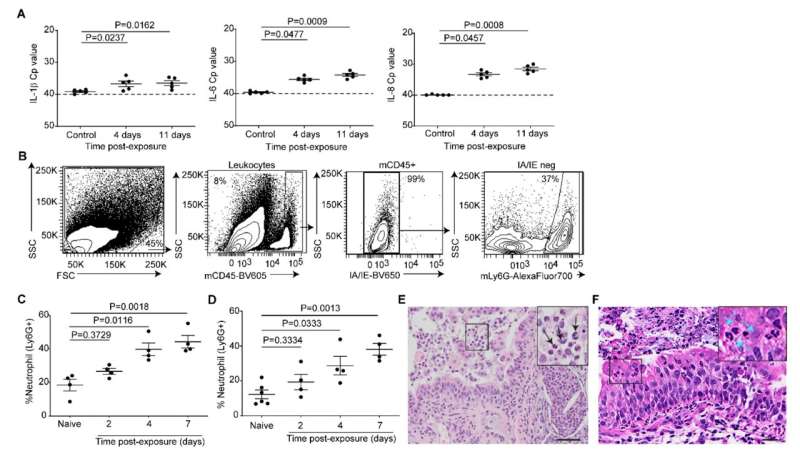This article has been reviewed according to Science X's editorial process and policies. Editors have highlighted the following attributes while ensuring the content's credibility:
fact-checked
peer-reviewed publication
trusted source
proofread
Study shows key role for human T cells in the control of respiratory syncytial virus (RSV) infection

Respiratory syncytial virus (RSV) is a highly contagious and seasonal respiratory virus that mainly causes common cold symptoms in healthy adults but can cause more serious lung infections in infants, the immunocompromised and older individuals. Strikingly, RSV infection remains the most common reason for hospitalization of infants and young children.
Recently, health officials anticipating a season of respiratory illness to rival some of the worst cold and flu seasons on record, have encouraged flu shots and reformulated COVID boosters. However, these options are not currently available for protection against RSV related lung disease.
But this is changing, and a new study published in JCI Insight, led by Angela Wahl, Ph.D., Raymond Pickles, Ph.D., and J. Victor Garcia, Ph.D., with the International Center for the Advancement of Translational Science (ICATS), the Department of Microbiology and Immunology, and the Institute for Global Health and Infectious Diseases (IGHID) at the UNC School of Medicine has shown that human T cells have an important role to play in controlling infection.
"Vaccine strategies for RSV have largely focused on the induction of an antibody response. Using novel precision animal models of RSV infection, we've gained novel insight into how the human immune system, and in particular human T cells, controls and clears RSV infection," said Wahl, assistant professor of medicine and assistant director of the UNC ICATS.
"Our data shows that T cells can independently control RSV infection in human lung tissue in the absence of an RSV-specific antibody response. While a vaccine-induced RSV-specific T cell response would not be able to prevent infection, it could accelerate virus clearance and ameliorate disease if vaccine elicited antibodies fail to prevent infection, due to antigenic variability among circulating strains."
The research team used two novel precision animal models to analyze RSV-induced human lung pathology and human immune correlates of protection at pre-determined time points. They showed that primed human CD8+ T cells or CD4+ T cells effectively and independently controlled RSV replication in human lung tissue in the absence of an RSV-specific antibody response. This preclinical data supports the development of RSV vaccines which also elicit effective T cell responses to improve RSV vaccine efficacy.
"It remains to be determined if vaccine efficacy fluctuates during RSV seasons due to variations in the circulating strains, and how long protection would last. But vaccines which can elicit T cell immunity may provide long-term protection against RSV infection and limit the severity of subsequent lung disease" said J. Victor Garcia, professor of medicine and director of UNC ICATS.
"With our recent experience with a global pandemic caused by SARS-CoV-2 and the success of vaccines which are formulated to elicit neutralizing antibody responses it will be critical to understand how vaccine design can be tuned to also mount an effective T cell response against viral pathogens including RSV to more effectively clear infection from the lung" said Raymond Pickles of the UNC Microbiology and Immunology Department who was also involved in this study.
An effective and safe RSV vaccine is a priority for the WHO Initiative for Vaccine Research, but the incomplete understanding of how the human immune response controls RSV infection has proven to be a major hurdle towards developing an effective vaccine. On May 3, the U.S. Food and Drug Administration approved GSK's Arexvy vaccine for the prevention of lower respiratory tract disease caused by RSV in individuals 60 years of age and older. Pfizer and Moderna also have two candidate vaccines that have shown efficacy against RSV-associated respiratory tract in Phase III clinical trials.
More information: Chandrav De et al, Human T cells efficiently control RSV infection, JCI Insight (2023). DOI: 10.1172/jci.insight.168110





















